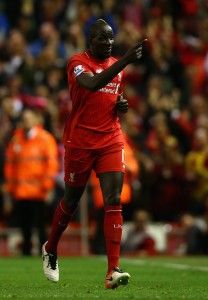The immediate online reaction to Mamadou Sakho’s failed drugs test was predictable.
There was nothing to see here as far as some supporters of Liverpool were concerned, while fans of their rivals wanted an example to be made of the defender who they said had cheated and trampled all over the spirit of the game.
The fact that the failed test took place after the second leg of Liverpool’s Europa League tie against Manchester United added to the polarisation.
The tribal element is tiresome, a noise to be disregarded when considering Sakho’s failed test and what it means for football’s attitude to doping in sport.
Perhaps the reaction demonstrates that football supporters do not care about doping, except when it can be used to target a rival, but the online reaction to most issues in football would suggest that supporters don’t care about anything other than their team.
If you need a fat burner when you train every day….#bullshit
— Stan Collymore (@StanCollymore) April 23, 2016
Sakho has not yet been suspended by the authorities and he has until Tuesday to answer his case. The suggestion is that he will ask for the B sample to be tested.
“Yesterday, a formal communication was received from Uefa stating that they are investigating a possible anti-doping rule violation by Mamadou Sakho,” Liverpool’s club statement released on Saturday said. “The player will respond to Uefa on the matter. The player is currently not subject to any playing suspension. However, the club, in consultation with the player, has decided that while this process is followed the player will not be available for selection for matches.”
Liverpool might have to do without Sakho for some time or he may prove his innocence, but the wider issue of doping in football is likely to be forgotten about pretty quickly.
There are plenty of others who will take the same line as Liverpool supporters without having any allegiance. There are plenty who will think the sport has little to be concerned about because of the belief that doping can’t make you a better player. It can, of course, make you a more effective player.
It is only three weeks since ‘The Sunday Times’ published allegations about doping in football after they secretly recorded conversations with Irish doctor Mark Bonar in which he claimed to have treated footballers with EPO and Human Growth Hormone.
But Bonar was so easy to discredit that many felt there was no weight to anything he was saying and it was easy to move on.
But football keeps moving on, keeps finding reasons not to talk about doping, keeps asking why footballers would dope to improve skill sets that drugs can’t improve when the question should be: why wouldn’t they dope?
Why wouldn’t they dope when there is so much to gain in terms of endurance and improved fitness? Why wouldn’t they dope when there is so little chance of being caught?
Of course there will be those, and Sakho must be presumed to be one, who make an innocent mistake. Those who will pick up their wife’s slimming tablets or cross some line they weren’t aware of when taking a medication or, as been reported in this case, a fat burner.
“The 26-year-old is believed to have not known the composition of the supplement,” the Liverpool Echo reported, “and has informed the club he acted in good faith.”
Sakho will want to prove his innocence. A player who is now idolised by Liverpool supporters and who has become a key figure in Jürgen Klopp’s side won’t want his reputation to be tarnished in this way.
But if it is any consolation, most people will forget pretty quickly and maybe it doesn’t matter,
Maybe the supporters who don’t care when it’s their player are right. Maybe elite sport is so disconnected and demanding that the idea that excellence can be achieved by natural methods is naive and foolishly romantic
When Dinamo Zagreb’s Arijan Ademi failed a drugs test after his side had beaten Arsenal in the Champions League, Arsene Wenger said UEFA “basically accepted” doping by not overturning the result. UEFA will only consider overturning a result or disqualifying a team if two or more players fail a test.
If football was serious about tackling doping, they might have listened to Wenger in this case and decided that the strict liability extended to the club as well as the player. If football had been serious about tackling doping, that might be the sanction facing Liverpool today.
But football hasn’t got a doping problem, so that would be extreme, especially as the clubs would argue that they can’t control everything their players take. However, they’d probably get better at it if that was the sanction.
Arijan Ademi was banned for four years by Uefa which angered his club. “To punish a player for four years after he and the experts proved that he took a contaminated supplement is senseless,” the club’s coach Zoran Mamic said.
Ademi had been foolish, his coach said. “Rules are rules and one must be careful what one consumes, but this is just too much because it’s obvious he didn’t know what he was doing.”
Ademi was just another innocent, another who will fight to clear his name while football moves swiftly on to something else.








































